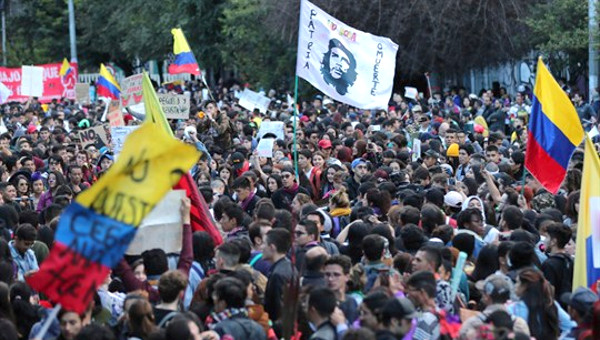Disaster in the Making: Canada Concludes Its Free Trade Agreement With Colombia
What’s the monetary value of a Colombian trade unionist’s life? As it turns out, it depends on how many are killed in a given year since the potential fines the Colombian government will have to pay as penalty under its free trade agreement (FTA) with Canada whenever a union activist is killed is capped at $15 million. If this sounds like a sick joke I apologize, but this is in effect what the Canadian government actually negotiated.
On June 7th, Canada proudly proclaimed that it had successfully concluded its trade deal with the human rights-troubled Andean country. Negotiated with an efficiency that must make the Bush administration – whose own trade agreement with Colombia has stalled because of Congressional opposition – jealous, the deal was concluded less than a year after negotiations began.
With four Canadian cabinet ministers visiting Colombian president Alvaro Uribe and other members of his cabinet between July 2007 and February 2008, it’s clear the Harper Tories had made the trade deal a major priority despite Colombia’s appalling human rights record (see, for example, my article on Canada and Colombia). As new Foreign Affairs minister (and ex-Liberal), David Emerson, declared, “The Government of Canada is delivering on its commitment to open up opportunities for Canadian business in the Americas and around the world.”
The agreement, which still hasn’t been made public, will now undergo a legal review by Canadian and Colombian lawyers. After the review is completed, it’ll be brought to the House of Commons for ratification, which should not be a problem for the Tories despite their minority government since the Liberals have said they’ll support it if it contains language on human rights. It does – but I’ll come back to that in a moment.
Let the Canadian Capitalist Onslaught Begin
Like the trade deals before it (NAFTA, Israel, Chile, Costa Rica and most recently Peru), the Canada-Colombia FTA will significantly reduce tariffs on exports between the participating countries across a whole range of industries. But like the trade deals before it, it perhaps more importantly opens another country up to Canadian investment. As a press release from Foreign Affairs states, “Once implemented, the agreement will lock in market access for Canadian investors and provide them with greater stability, transparency and protection for their investments.”
Since NAFTA, Canadian-negotiated free trade deals have included chapters that provide extremely strong corporate investment rights (the infamous chapter 11 in NAFTA). That’s the “stability, transparency and protection” Foreign Affairs is talking about. Canadian multinationals will now be given privileged access to the Colombian market and its resources, backed up by the right to sue Colombian governments if they feel their rights under the trade agreement haven’t been fulfilled – as might be the case, for instance, if local community opposition halts a mining project. Canadian companies have in fact been actively litigious under the other trade agreements; they are more likely to sue foreign governments than their foreign counterparts are to sue Canadian governments.
Add to the new FTA the aggressive neoliberal restructuring Colombia has already undergone in the last several years, including the Canadian International Development Agency (CIDA)-funded rewriting of its mining code (which allows corporations access to indigenous land) and the ridiculously low royalty rate imposed on foreign investors (as low as 5% in the oil sector and 0.4% in mining), and Canadian corporations could have a field day. Colombia is rich in petroleum, natural gas, coal, iron ore, nickel, gold, copper, emeralds, and hydropower – and Canada has the largest mining industry in the world, and not insignificant oil and hydropower sectors.
The Colombian FTA is part of Canada’s so-called Global Commerce Strategy, a significant part of which is increasing Canada’s economic influence in the Americas. According to the Foreign Affairs press release announcing the conclusion of the trade negotiations, “The Strategy includes an aggressive trade negotiation agenda that aims to secure competitive terms of access in markets that offer significant potential for our products and expertise.” This strategy has clearly been a success in Colombia.
Putting a Price on the Lives of Trade Unionists
Never mind that an earlier wave of Canadian investment in the 1990s was a disaster for Colombian trade unionists and indigenous people. Canadian investments in mining (Corona Goldfields, for example), oil (Enbridge, for example), telecommunications (Nortel, for example) and hydro-electric power (BFC Construction and Agra-Monenco, for example) in the 1990s proceeded on the basis of murder and displacement.
Stephen Harper and his cronies claim that President Uribe is addressing his country’s human rights problems. The reality, however, is quite different: paramilitary murders have remained steady since Uribe was elected in 2002, while according to several human rights organizations the rate of trade union assassinations in 2008 is thus far greater than in 2007. Colombia is by far the most dangerous place in the world to be a union activist, with more than 2000 murdered since 1991. And forty percent of the human rights violations committed against unionists are in the mining sector – where Canadian corporations are strongest. Paramilitaries are responsible for the majority of the violence, and currently the Uribe government is embroiled in a scandal in which several dozen of the President’s political associates (including a member of his family) have been found to have ties to them.
So how will a FTA improve the human rights situation in Colombia, rather than make it worse? How will Canada ensure that Canadian companies won’t profit off of Colombia’s climate of fear, persecution and murder? The answer, apparently, is the Labour Cooperation Side Agreement (LCSA). Canada’s Labour Minister, Jean-Pierre Blackburn, argues that the FTA “contains some of the most comprehensive labour provisions to be found in any agreement in the world,” adding for good measure that “as the Colombian government moves forward to strengthen labour rights after a difficult past, Canada will be there to help.” How charitable.
LCSAs aren’t new, however. They call on the parties to trade agreements to enforce their own labour standards, and to keep those standards in line with those of the International Labour Organization (ILO). But Colombia doesn’t currently follow its own labour standards. After all, it doesn’t have legislation allowing for the murder of union activists. That’s the most egregious example of the violations of Colombia’s labour law; mass firings and union decertification regularly happen with impunity as well.
Canada’s solution: to add a little twist to the Colombian FTA’s LCSA, which is clearly meant as window dressing and little more. According to Foreign Affairs’ press release on the trade agreement (which is all we have to go on right now), “If obligations [under a country’s labour law] are not respected, the offending country may have to pay up to $15 million in any one year into a cooperation fund, which will be used to resolve issues identified through the dispute resolution process.”
This is a de facto decriminalization of murder. Trade unionists regularly face physical violence in Colombia, and Canada’s response is a system of fines. It seems the Tory’s law-and-order zealotry flew out the window here. According to the International Centre for Trade Union Rights, in 2007 there were a recorded 384 major human rights violations committed against union activists, including 38 assassinations, 11 “disappeared,” 16 armed attacks, 201 threats of physical harm, 14 illegal arrests and 95 people forced to move for safety reasons. At a $15 million cap, that’s $39,062.50 per major rights violation. But that’s recorded violations, and it doesn’t include mass dismissals, illegal union decertification and so on, all of which brings down the cost per rights violation. True to its capitalist form, the FTA’s human rights penalty works on an economy of scale: the more the Colombian government and its paramilitary allies violate the rights of unionists, the cheaper it is for them. More bang for their murderous buck – and Canada is completely complicit.
This may be a moot point, though, at least as far as the paramilitaries are concerned. Even though they’re responsible for the majority of rights violations, despite all the evidence to the contrary they retain an official independence from the state. And Canada hasn’t said whether the Colombian government will be held responsible for paramilitary abuses, or if it will get a pass on this.
On top of that, Foreign Affairs’ press release doesn’t mention indigenous peoples and peasants, who are at the greatest risk of violence in the country. Paramilitaries assassinate several hundred people a year, most of whom are indigenous or poor peasants living on land rich in oil or subsurface minerals. The press release also doesn’t explain who’ll participate in the dispute resolution process. It’s hard to participate when you’re dead or when you’re too scared to testify. Or is the Colombian government, which is implicated in the rights violations through its security apparatus and its ties to paramilitaries, expected to take up the cause of the country’s oppressed?
In an earlier article (whose link is provided above) I argued that Canada’s rapprochement with Colombia is also geopolitical in nature – support for a country that offers itself as a bulwark against anti-imperialism in the Andean region. The new FTA, with its cavalier attitude towards Colombia’s passionate distaste for human rights, will only strengthen that relationship and encourage Colombia to continue doing what it does so well, while at the same time offering Canadian companies great new opportunities to make profit. And so it goes with Canadian foreign policy in the Andean region – profits over people, misery and violence over social justice. •
Todd Gordon is the author of Cops, Crime and Capitalism: The Law-and-Order Agenda in
Canada. His articles have appeared on Znet and in New Socialist magazine. He is an assistant professor of Canadian Studies at the University of Toronto, and can be reached at ts.gordon@utoronto.ca.




